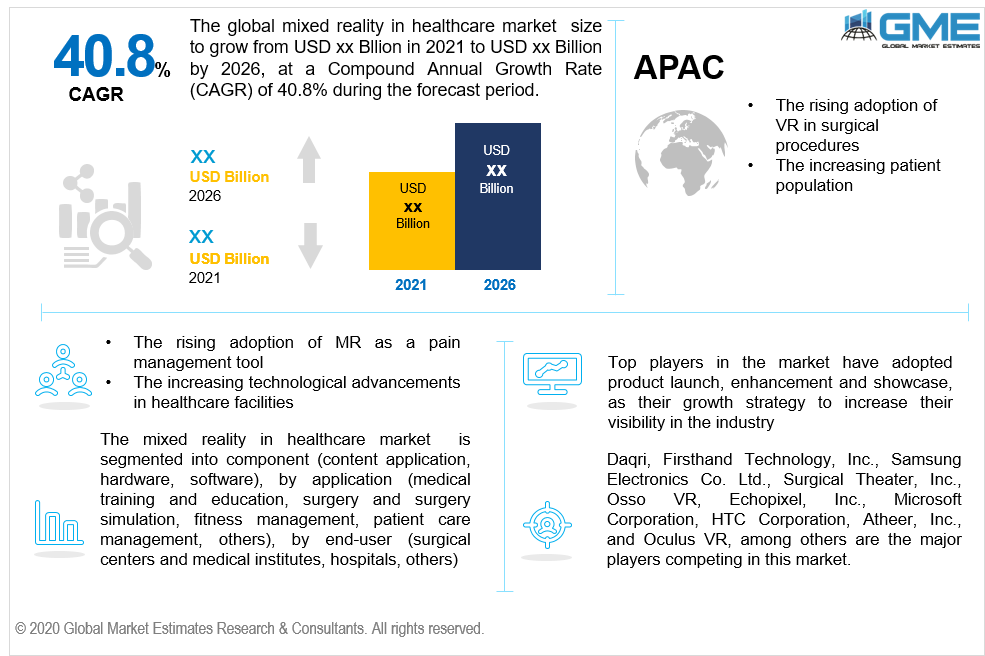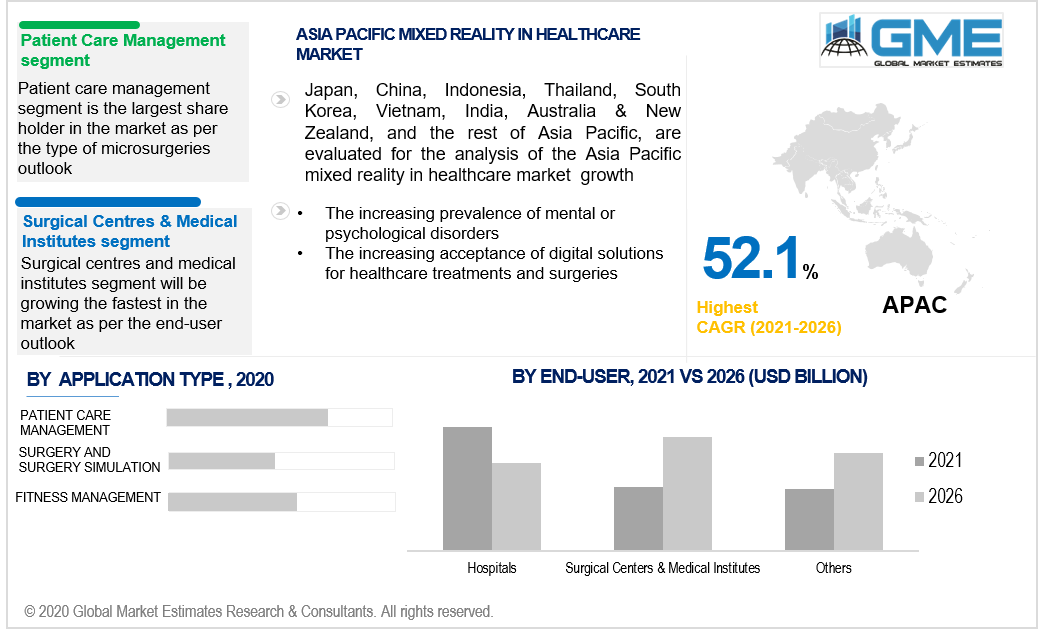
Global Mixed Reality in Healthcare Market Size, Trends, and Analysis- Forecasts To 2026 By Component (Content Application, Hardware, and Software), By Application (Medical Training & Education, Surgery Simulation, Fitness Management, Patient Care Management, and Others), By End-User (Surgical Centers & Medical Institutes, Hospitals, Others), By Region (North America, Asia Pacific, CSA, Europe, and the Middle East and Africa); End-User Landscape, Company Market Share Analysis & Competitor Analysis
Mixed reality is a combination of both virtual reality (VR) and augmented reality (AR) with digital elements. This is an innovative technology with immense potential in the healthcare sector. MR technique enables AR to move static images to enhance the experience and VR engages the observer in a virtual 3D world. The increasing demand for digital technology in the healthcare industry along with an increasing awareness of the use of mixed reality technology inpatient care management applications is expected to support market growth during the forecast period. The rising incidence of psychological and neurological disorders and technological developments in healthcare facilities across the globe will fuel the market demand. Furthermore, the improvement in the quality of surgical treatments and the rising adoption of error-less procedures is projected to increase the demand for mixed reality in the healthcare market between 2021 and 2026.

Content application, hardware, and software are the three different types of components. In terms of revenue over the projected timeline, the software segment holds the largest market shareholder. This is due to improved user availability and usability of software and growing awareness of the use of software platforms for different healthcare purposes. Moreover, the growing adoption of software technology for better patient satisfaction is further driving the growth of the segment.
Medical training and education, surgery simulation, fitness management, and patient care management are the four segments according to the application outlook. In 2020, the largest market shareholder was the patient care management segment. This can be attributed to factors such as the growing prevalence of cancer and the increasing importance of patient care management for patient referrals.
The end-user sector can be divided into three categories namely, surgical centers & medical institutions, and hospitals, among others. The hospital segment is expected to dominate the market over the expected timeline. The increasing adoption of mixed-reality technology for better patient care and management and mental health is driving the growth of this segment.

The dominant market segment as per revenue generation is held by the North American region. This is due to the large patient population, increasing geriatric population, growing availability of advanced healthcare infrastructure, and increasing research and development investments. On the other hand, due to the rising awareness regarding healthcare IT integrations and the acceptance of digital solutions for healthcare procedures, the Asia Pacific region will be the fastest-growing region. The growing prevalence of mental or psychological disorders clubbed with the increasing innovation in treatment procedures is likely to boost the demand for mixed reality in healthcare in the market.
Daqri, Firsthand Technology, Inc., Samsung Electronics Co. Ltd., Surgical Theater, Inc., Osso VR, Echopixel, Inc., Microsoft Corporation, HTC Corporation, Atheer, Inc., and Oculus VR, among others are the major players competing in the mixed reality in the healthcare market.
Please note: This is not an exhaustive list of companies profiled in the report.
In May 2019, the second-gen HoloLens, namely the HoloLens 2, was launched by Microsoft.
We value your investment and offer free customization with every report to fulfil your exact research needs.
The Global Mixed Reality in Healthcare Market has been studied from the year 2019 till 2026. However, the CAGR provided in the report is from the year 2021 to 2026. The research methodology involved three stages: Desk research, Primary research, and Analysis & Output from the entire research process.

The desk research involved a robust background study which meant referring to paid and unpaid databases to understand the market dynamics; mapping contracts from press releases; identifying the key players in the market, studying their product portfolio, competition level, annual reports/SEC filings & investor presentations; and learning the demand and supply side analysis for the Mixed Reality in Healthcare Market.

The primary research activity included telephonic conversations with more than 50 tier 1 industry consultants, distributors, and end-use product manufacturers.

Finally, based on the above thorough research process, an in-depth analysis was carried out considering the following aspects: market attractiveness, current & future market trends, market share analysis, SWOT analysis of the companies and customer analytics.

Tailor made solutions just for you
80% of our clients seek made-to-order reports. How do you want us to tailor yours?
OUR CLIENTS